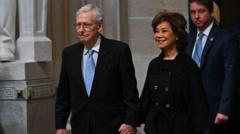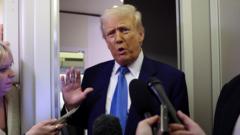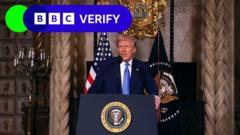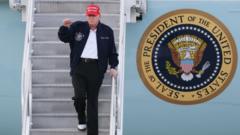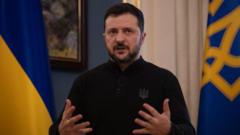The recent approach taken by President Trump marks a significant departure from historical U.S. foreign policy towards Russia, with strong implications for international relations.
Trump's Shift in Foreign Policy: Aligning with Russia at the Expense of Ukraine

Trump's Shift in Foreign Policy: Aligning with Russia at the Expense of Ukraine
As U.S.-Russia negotiations commence in Saudi Arabia, President Trump conveys a controversial turn in foreign policy, blaming Ukraine for the ongoing conflict.
In an unprecedented shift, President Trump has communicated that the longstanding U.S. strategy of isolating Russia is effectively at an end. This comes as peace talks have begun in Saudi Arabia, featuring top U.S. officials and Russia, yet notably absent of Ukrainian representatives.
Secretary of State Marco Rubio was photographed engaging with Russia's Foreign Minister Sergey Lavrov in discussions while the conflict continues to ravage Ukraine. This emerging narrative poses Ukraine as culpable for the war, as Trump suggests they could have negotiated peace by giving up territory rather than standing firm.
Mr. Trump’s interview, where he disregards Ukrainian sovereignty and leadership, hints at a foreign policy where Russia is seen less as an adversary and more like a partner. The reframing of the geopolitical narrative around the Ukraine conflict starkly contrasts with previous presidential administrations. Traditionally, U.S. presidents have viewed Russian actions, particularly the invasion of Ukraine in 2022, with condemnation.
Trump's comments indicate a desire to shift allegiances away from traditional allies in favor of a partnership with Russia. He has leveled criticisms solely at Ukrainian leaders, emphasizing that the war was avoidable, neglecting Russia’s long-standing aggression, including its initial annexation of Crimea in 2014.
This marked change poses challenges for both allies and adversaries alike, fostering an environment where countries will need to reconsider their stance amid these rapidly changing dynamics in U.S. policy. The implications of Trump's approach may fundamentally alter alliances and international strategies as the world navigates this unprecedented landscape in foreign relations.
Secretary of State Marco Rubio was photographed engaging with Russia's Foreign Minister Sergey Lavrov in discussions while the conflict continues to ravage Ukraine. This emerging narrative poses Ukraine as culpable for the war, as Trump suggests they could have negotiated peace by giving up territory rather than standing firm.
Mr. Trump’s interview, where he disregards Ukrainian sovereignty and leadership, hints at a foreign policy where Russia is seen less as an adversary and more like a partner. The reframing of the geopolitical narrative around the Ukraine conflict starkly contrasts with previous presidential administrations. Traditionally, U.S. presidents have viewed Russian actions, particularly the invasion of Ukraine in 2022, with condemnation.
Trump's comments indicate a desire to shift allegiances away from traditional allies in favor of a partnership with Russia. He has leveled criticisms solely at Ukrainian leaders, emphasizing that the war was avoidable, neglecting Russia’s long-standing aggression, including its initial annexation of Crimea in 2014.
This marked change poses challenges for both allies and adversaries alike, fostering an environment where countries will need to reconsider their stance amid these rapidly changing dynamics in U.S. policy. The implications of Trump's approach may fundamentally alter alliances and international strategies as the world navigates this unprecedented landscape in foreign relations.


